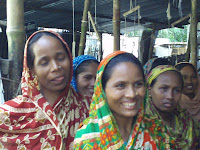We're off to Bogra and Rangpur in the north, where these two business men have a substantial production setup for baskets and small rugs. They run a 'commercial venture with a heart', working with companies overseas who are interested in purchasing goods as part of their Corporate Social Responsibility (CSR), some going as far as donating 100% of their profits back into the project (which is tax deductable one would assume..). Training is supported by a large international NGO. As such this fits the description of a public-private partnership (PPP).
The business men run some 19 'units' where they employ predominantly women to make the baskets and weave the small carpets. There is one male weaving unit and ~ with an exception or two ~ the supervisors in each unit and those handling the raw materials are generally male. All together these men employ some 600 people, meaning that they make a difference to 600 village families across a number of locations.
Although this is piece-work and the income by western standards is pitiful, the working conditions are generally good in that these are not sweat shops. Basket weaving happens sitting on the floor, but it is the customary way. I gain instant respect for these women and the speed with which they make baskets. When I try, I fail miserably ~ my stitches are pitifully irregular and I pull so hard on the fibre that it breaks, creating great merriment among the girls.
 |
| irregular weaver |
 |
| women basket weavers |
 |
| weaving different sizes |
The women work an 8-hour day max.The company has installed fans for ventilation (in several units the fans run on solar power), there are toilets for the staff, proper exit-signed doors, fire alarm systems and even music. The company is keen to achieve the highest possible standard for their production units, looking to get the government 'good' stamp of approval by the end of this year. This stamp of approval means little in Bangladesh (and there are only a handful of companies who bother to achieve this level), but carries exponentially more weight on the other side of the supply chain. It would be bad form for a touted CSR initiative to be exposed down the line as having been involved in sweat shop dealings.
 |
| carpet weaving |
 | |
| weaving women |
As of November the garment industry is setting a minimum wage of 3000 taka/month (approx. A$45) which the company promises it will honour. This may not seem much of an income , but it is a great deal more regular (key !) earnings than these women have ever experienced. If turnover is good staff also get bonuses. One of the hardest things, the company tells me is to get these women to understand the concept of employment, meaning that they have to turn up for work 6 days a week. Official muslim holidays are honoured, but many of these women are Hindu and have their own calendar of events, let alone farming, family and child rearing duties, which have a way of interfering with work.
I speak directly (by way of interpretation, that is) to the women to ask if they are happy working for this company. They agree in unison that they are very happy with the opportunity for regular work and that there life has improved considerably. They now have money to buy clothes, send their children to school and some have even bought land (to be farmed by their idle husbands). Their position in the family has improved as they now wield more power being the bread winner in the family. Some are still forced to hand over their entire earnings and the empowerment of these women must predominantly be seen on a family rather than a community level, although there are some women who are taking on leading roles in local government.
 |
| happy workers |
In comparing what I have seen so far ~ communities dependent on micro-credit going broke; communities living on aid such as in the cyclone devastated community preferring to stay dependent and unmotivated as it is a lot easier to get handed money than earning it (according to my host); and communities trying to make ends meet by being day labourers or micro entrepreneurs without access to markets ~ this looks like a win-win model for all. A PPP where where women are empowerment through employment; where the marketing and market access is in the hands of entrepreneurs; and where the NGO perform the task of training and handling funds for current & future projects.
I am enthused by this setup as it combines ways to reach the poor and extreme poor (Millenium Development Goal (MDG) Number 1 is to alleviate poverty and hunger by 2015 and 10% of Bangladesh's population of 160 million falls into the extreme poor category), which is not dependent on aid or credit and appears to be a successful working partnership. If it is a replicable model is another story, as there are many market-related issues that these entrepreneurs face and solve along the way which would not easily without the right connections and networks.
After a longgg car trip home from Rangpur, I spend the night and the next two days resting in extremely wet Dhaka as the country is in the grip of a massive rain storm flooding roads, bridges and entire villages. I am grateful for the rest as I've eaten some dodgy food somewhere along the way and my stomach is acting up.

No comments:
Post a Comment